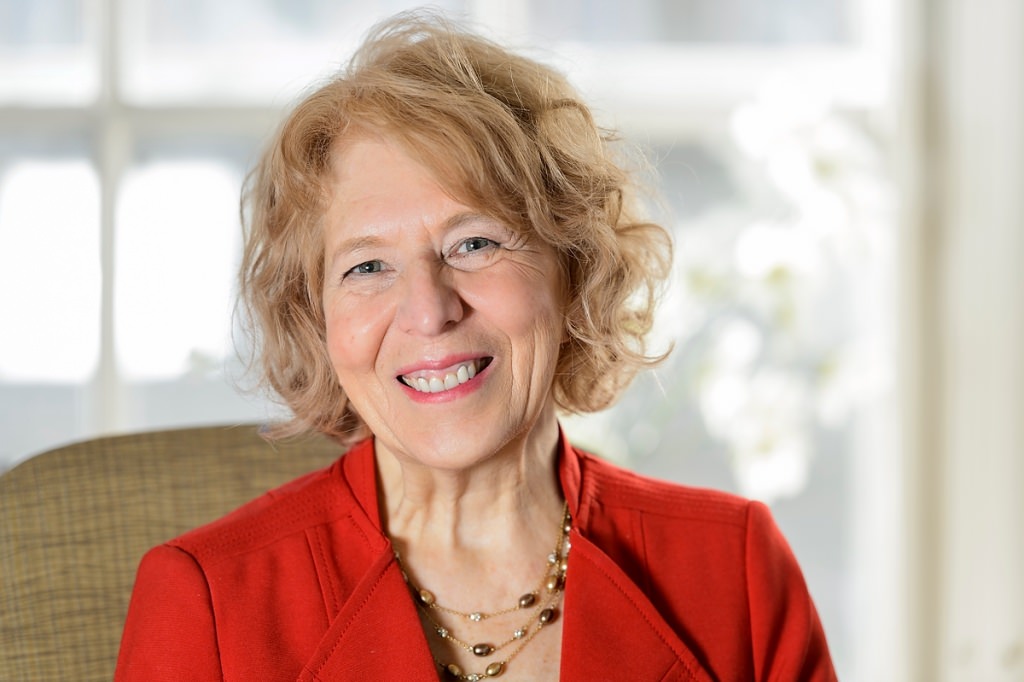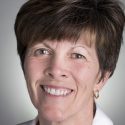Q&A: Cotter to retire after more than a quarter century at UW-Madison

Maury Cotter, director of the Office of Quality Improvement, is pictured in her Bascom Hall office. Cotter is planning to retire in early 2017. Photo: Jeff Miller
Maury Cotter has a long history at the University of Wisconsin–Madison. First as a student. Then as a leader in improving education.
After 26 years at UW–Madison, Cotter will retire in January from her position as director of UW–Madison’s Office of Quality Improvement. The office has made a tremendous impact on campus, receiving in October a silver Facilitation Impact Award from the International Association of Facilitators (IAF). The award recognizes more than two decades of “achieving positive and measurable impact through excellence in facilitation.” Reporting to the provost, OQI serves as an internal consulting service available upon request to academic and administrative units and initiatives across campus. It provides organizational excellence services upon request, including strategic planning, project management, restructuring, process improvement and change management.
Before she leaves Bascom Hall, Cotter takes some time to reflect upon her time on campus.
What was your time like here as a student?
I was here from 1968-72, in the heart of the Civil Rights and Vietnam eras. I have photos from my room in Sellery Hall looking down at the National Guard, and memories of tear gas on State Street and men in uniforms guarding my classroom buildings. The Sterling Hall bombing happened in my junior year. Classes were canceled for some portion of every Spring I was here due to protests on one or more issues. Thirty years later, when my daughter was in school here, I was struck by the contrast when I saw photos from 1968. I was happy for her sake. At the same time, I realized how much that had been part of my learning experience. Coming from small town Wisconsin, it stretched my perspectives, and my understanding of a larger world. Students were aware of and taking part in world issues, caring about and fighting for people they didn’t know, in many cases, and, in the end, making a difference. It made everything else I learned have a broader context and meaning. I hope all our students have some opportunity in their learning experiences to engage in some way with understanding and perhaps helping people beyond their own worlds.
When did you start working at UW–Madison and what was your initial role?
In 1990, I slipped in the back door of Bascom Hall as a part time LTE with my BA degree. I had a decade of experience in the private sector and state government. I was hired during the Donna Shalala administration to help explore and initiate quality improvement approaches on campus. Chancellor Shalala thought students should be treated as customers, a radical concept. John Wiley engaged me to help the Graduate School reduce admissions processing time from 99 days to five. We stayed low key and worked with people who wanted help moving forward. OQI has always used the philosophy of serving as a resource where there are leaders and opportunities, versus pushing an idea on anyone.
What have been some of the biggest changes you’ve seen in higher ed?
I would say higher education’s penchant for change has shifted significantly. When David Ward, as provost in 1990, saw the need for strategic thinking, he picked up a plan that faculty had developed as part of the reaccreditation self-study, and he implemented it. It was the beginning of a continuous, faculty engaged culture of strategy and change that continues today. Over time, the change efforts have been bigger and bolder, rethinking what we do and how, and using creative approaches to address complex world problems. In 2015/16, OQI received and responded to more than 140 requests for services. We have worked in every school and college, and more than 200 academic units over time, all by request.
What is something you learned early in your career?
Culture matters. In fact, culture eats strategy for breakfast. I learned that with the first projects in the graduate school. They chewed me up and spit me out a few times, but, luckily, kept inviting me back in to try again. Eventually, I learned, with a few scars to remind me.
Another interesting thing is how many cultures there are in a university like ours. In a single day, one of us might work with the department of Surgery and with Theatre and Drama. In fact, we are working with both those departments right now, along with engineering, anthropology, pharmacy, corporate relations, and many others. For that reason, among others, we don’t have a cookie cutter approach to anything. We customize whatever we do based on what that unit wants and needs.
What are you most proud of during your time at UW–Madison?
I’m proud of the fact that our office has found a way to become a service in high demand in the culture of academia. We have been leaders nationally in establishing a Network for Change and Continuous Innovation in higher education – NCCI. Through that and continuous inquiries and visitors from universities around the world, we have helped shape the field of strategy and improvement in higher education. I’m most proud of the degree to which our office has been asked into the heart of the academic enterprise to help shape the future and address complex problems.
What will you miss the most about working here?
I’ll miss my OQI and campus colleagues. I’ll miss the amazing leaders I have had the opportunity to work with at every level. I’ll miss the constant opportunities to work on new problems every day with smart people who are trying to make something better. Period. How lucky I have been to do that for 26 years.
What are your plans for retirement?
MC 2.0. It’s a new beginning. My first post retirement consulting job is with the OECD (Organization for Economic Cooperation and Development) in Paris. I’m casting my net widely; open to possibilities I might not have imagined.
I also plan to continue to contribute to UW–Madison, through my continued work on the Carbone Cancer Center Advisory Board. My daughter, Kelly, was diagnosed with leukemia and had a bone marrow transplant from my son, Adam, when she was 12 and he was 8. The research and the care from this institution saved her life. They are now both grown and healthy, with children of their own. We have remained engaged and committed to the American Family Children’s Hospital and the Carbone Cancer Center over the last 28 years.
UW-Madison is good at providing opportunities for retirees, and I’m excited to explore possibilities. And top of my list are three grandchildren: Enzo, Teo and Miss Evelyn. I am truly blessed. On Wisconsin!


